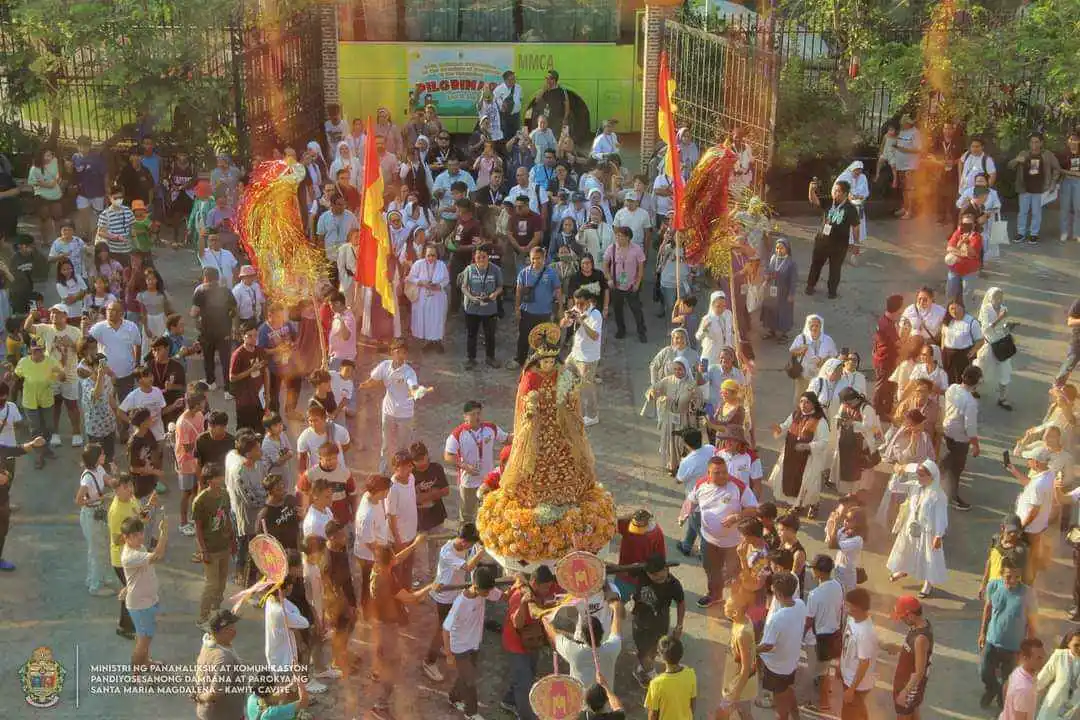Kawit Parish Celebrates 400 Years With Grand Magdalenean Procession | Ahnnie Sarile
By: Ahnnie Sarile
|
Published on: June 14, 2024

Magdalenean Procession in Kawit, home the Philippine Independence Day. Photo from author.
What is the next anticipated event in Kawit, Cavite, after the Philippine Independence Day? Kawit Parish, also known as the Diocesan Shrine and Parish of Saint Mary Magdalene, is celebrating its 400 Years of Evangelization with a Grand Magdalenean Procession on June 15, 2024.
I interviewed Angelo Jarin Aguinaldo from the Committee on 400 Years for details we can share with the public.
AS: Who are the participants of the grand procession?
AJA: Joining the Kawit Parish in the Magdalenean Procession are parishes from around Luzon dedicated to the patronage of Saint Mary Magdalene. These are the parishes of Amadeo in Cavite, Calamba in Laguna, Magdalena also in Laguna, Olongapo City, Pililla in Rizal, and Poblacion, Sorsogon.
AS: What will the public witness during the celebration day?
AJA: Inspired by the theme “Vidi Dominium: Nakita ko ang Panginoon” (I have seen the Lord), it will be opened by a Eucharistic Celebration presided by Most Rev. Reynaldo Evangelista DD, Bishop of Imus at 4:30 PM at the St. Mary Magdalene Church. The procession starts at 6:30 PM.
The procession will be a gathering of venerated images and relics of St. Mary Magdalene from the various parishes and devotees who have a spiritual connection with the “Apostle to the Apostles.”
It is also part of the 100 days celebration leading to the 400 Years of Evangelization of Kawit on July 22, 2024, the feast of Saint Mary Magdalene.
AS: When did Kawit start its celebration for the 400 years milestone?
AJA: The celebration kicked off with a procession participated in by independent parishes who were once part of the Kawit Parish – Panamitan, Binakayan, Noveleta, Imus, and General Trias, and its Mother Church, San Pedro Apostol, Cavite City. A 9-Sunday novena mass was also held starting on May 19, 2024.
AS: What is the history of the 400 years Kawit is celebrating?
AJA: It was in 1624 that the Jesuits had the biggest mission of evangelization on the coast of Cavite Viejo, now Kawit. Hence, the area has been considered as fully Christianized.
AS: Is the current Kawit Church the original structure of the parish from 400 years ago?
AJA: The building of the stone church that people know of today was finished in 1715.
AS: What are the historic events related to the 400 years celebration in Kawit?
AJA: In 1613 and 1614, at a time when Cavite was proclaimed as a politico military province with Cavite Puerto as the capital, the Jesuits conducted missions in the Port of Cavite. Cavite Puerto (Cavite City) then was the staging ground of the flourishing galleon trade and soon became the principal port of Manila and a cosmopolitan town. The missions may have prompted the Jesuits to establish a mission house in Cavite, according to the Javellana research in 1991.
In 1615, the Archbishop of Manila Garcia Serrano later placed Kawit under the Jesuits. It was the same year the Jesuits opened a temporary church dedicated to the Nuestra Seῆora de Loreto and a mission house in Cavite Puerto where the Jesuit ministering both Cavite el Viejo (Kawit) and Binakayan resided. The Jesuits took spiritual charge of Cavite el Viejo instead of Cavite Puerto due to a lack of enough personnel.
Here is a video about the 400 Years celebration in Kawit:
Be part of our vibrant Good News Pilipinas community, celebrating the best of the Philippines and our global Filipino heroes. As winners of the Gold Anvil Award and the Lasallian Scholarum Award, we invite you to engage with us and share your inspiring stories. For stories Making Every Filipino Proud, reach out to GoodNewsPilipinas.com via Facebook, Twitter, Instagram, TikTok, YouTube, and LinkedIn. LinkTree here. Let’s spread good news together!
